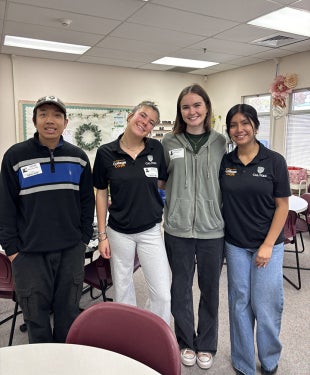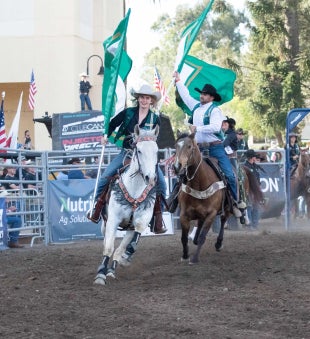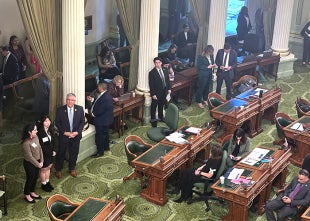Cal Poly Marketing Class Acts as a Full-Service Creative Agency for College Athletes Seeking Endorsement Deals
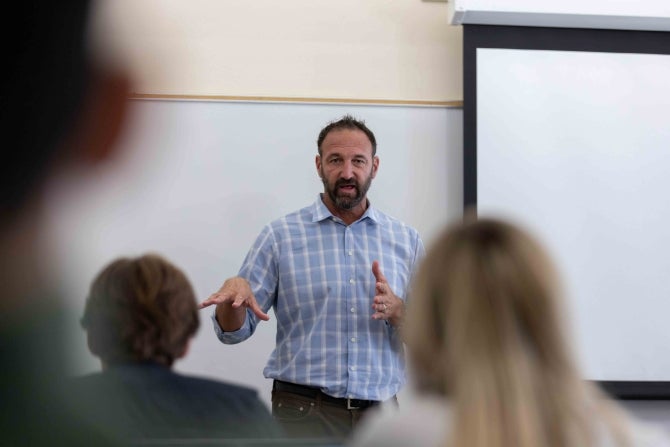
Contact: Pat Pemberton
805-235-0555; ppembert@calpoly.edu
SAN LUIS OBISPO — Now that college athletes can profit from their name, image and likeness, a Cal Poly class is acting as a mini-marketing agency, helping numerous athletes with promotional opportunities.
Randy Rovegno, a professor in the Orfalea College of Business, launched the Athlete Lab, which operates out of his marketing projects class, last fall.
“It’s a senior-level marketing class that serves as an internal sports agency to support their student-athlete peers and also get the local community to help facilitate opportunities,” he said.
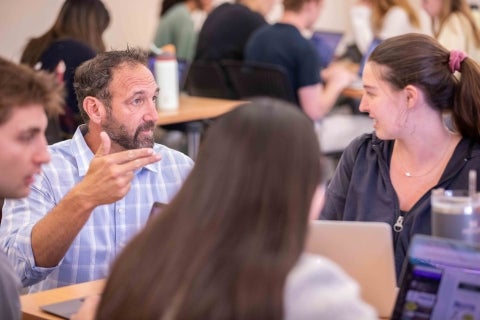
Rovegno brings 30 years of sports and entertainment marketing experience to the class, having worked at Fox Sports and CBS, where he was vice president of marketing. With his own agency, Longboard Marketing, he also performed work for ESPN, Disney, ABC and NBC. Some of the sports campaigns he worked on included famous athletes such as National Baseball Hall of Famer Rollie Fingers and former NFL players Ronnie Lott and Drew Brees.
Eager to share his knowledge, Rovegno had guest lectured for 15 years, including a stint at his alma mater, Arizona State University, before coming to Cal Poly last fall.
“I always knew eventually I’d wind up teaching full time,” he said.
At Cal Poly, he immediately launched his Athlete Lab, https://athletelab.org/, an idea he carried over from Arizona State.
For well over a century, college athletes were considered strictly amateurs and not allowed to profit from their participation in sports. But in 2021, the NCAA overturned its rule forbidding the athletes from making name, image and likeness (NIL) money.
Since then, star athletes like Ohio State receiver Marvin Harrison Jr. and University of Miami basketball twins Haley and Hanna Cavinder have profited greatly. But while Harrison is valued at $1.4 million and the Cavinder twins have reportedly made over $2 million off NIL deals, most college athletes aren’t going to get rich off their image.
“The new NIL rules have definitely changed the landscape of college athletics, favoring those schools that have wealthy donors and alumni,” said Kate Slack, a member of the Cal Poly volleyball team, who also took Rovegno’s class as a marketing student. “For Cal Poly, specifically, there are a lot of local opportunities, but we don’t have as many large-scale opportunities as nationally known (sports) schools might have.”
The class connected Aidan McCarthy, a record-breaking Mustangs track star in the 800 meters, with Quickie, a food delivery business that launched at Cal Poly, for promo spots, emphasizing the speed of Quickie deliveries. And members of the volleyball team recently appeared at Athleta women’s apparel store in San Luis Obispo, to sign autographs.
“It’s all scale,” Rovegno said. “Here we’re working for product, trade or cash. And it allows them to get their profile up, it gives them some swag, and they’re out there in the community — so if someone sees them doing a promotion, they might think, ‘I want to hire that person.’ ”
Because the rule change is new, college athletes don’t know what opportunities exist — or how to pursue them.
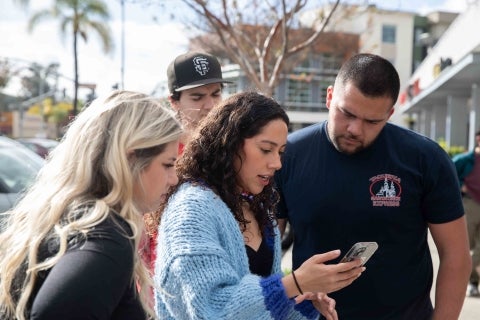
“Many student athletes are trying to navigate this new landscape on their own, which can be very tricky,” said Cruz Rubio, a long snapper on the Cal Poly football team, who recently filmed promotional videos with the class for the Taqueria Santa Cruz Mexican restaurant in San Luis Obispo. “But with the guidance and knowledge of Randy, it makes the whole process smooth and stress free.”
For each athlete the lab works with, students perform a SWOT (strengths, weaknesses, opportunities, threats) analysis, complete with graphics. The marketing students serve as account executives, project managers, and content creators.
As both an athlete and a student in the class, Slack has learned how to brand herself, which includes keeping consistent — and non-controversial— on all social media platforms.
“Another thing that we’ve learned in our class is to always have an elevator pitch ready, which is very important for branding,” said the Roseville, California, resident.
Rubio said he knows several other athletes who are working with the lab, and it has been a positive experience.
“The students get to learn and experiment within their class, and student-athletes get to benefit from the whole situation by essentially being guinea pigs for them,” said Rubio, a political science major from Anaheim, California.
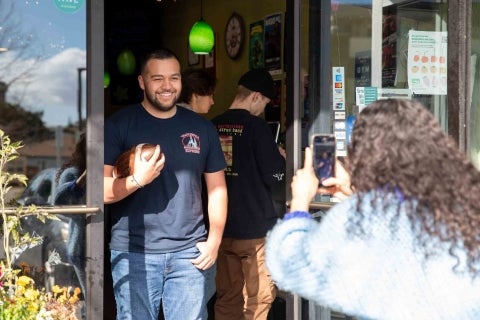
Rovegno hopes to expand the class and garner Cal Poly a reputation for its NIL work beyond San Luis Obispo.
Already, word of mouth has spread about what the class can do locally.
“I’m fielding probably three or four calls a week from athletes,” Rovegno said, “which is exactly what we want.”
Top photo: Professor Randy Rovegno talks to students in his marketing projects class, which he calls the Athlete Lab. He launched the lab last fall.
Photos by Jahan Ramezani | Cal Poly

